
1725NT
Planter
- 8-row, 30-in. spacing
- Transport width under 10 feet
- 1.6-bushel hoppers
Apply For FinancingMaintenance Plans
Features
1725NT Frame
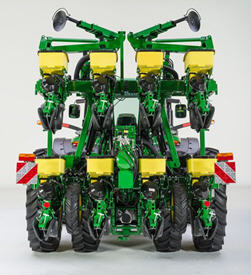 Stack-fold planter frame
Stack-fold planter frame
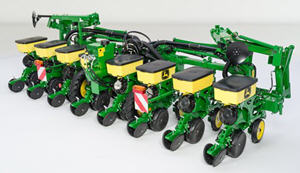 1725NT Planter frame
1725NT Planter frame
The 1725NT utilizes an integral, stack-fold frame that allows for a transport width of approximately 3.05 m (10 ft) and a height of just over 4 m (13 ft). Operators who drive on narrow roadways or work in small fields will find the narrow transport frame, without lift-assist wheels, to be especially useful in situations where maneuverability is limited.
This design also allows for the vacuum to be integrated into the frame without adding clutter to the bar. This means a cleaner look with better visibility from the operator station.
The 1725NT also includes 40.6-cm (16-in.) notched disk markers in the base machine, with an option for less markers. These markers act independent of the frame position and are controlled by a selective control valve (SCV). The notched disk design allows for a more aggressive marking capability, especially in minimum-till or no-till conditions.
Commodity storage
56.4-L (1.6 bu) hoppers available in base equipment
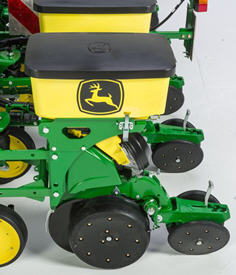 56.4-L (1.6-bu) hopper
56.4-L (1.6-bu) hopper
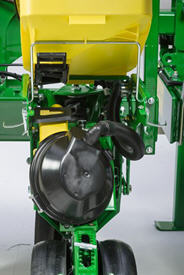 Access to the meter under the hopper
Access to the meter under the hopper
The 1725NT utilizes a unique 56.4-L (1.6 bu) hopper that can be tilted and braced upwards to gain easy access to the meter for adjustments or cleanout.
This design also has a shutoff door to allow for meter access when seed is still in the hopper.
Unit-mounted row cleaner with convenient screw adjustment
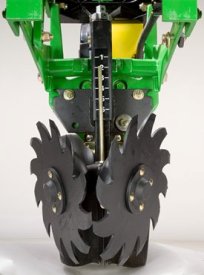 Screw-adjust unit-mounted row cleaner
Screw-adjust unit-mounted row cleaner
Row cleaners are a valuable tool in reduced tillage planting conditions. The row cleaner helps to clear residue from the path of the opener, ensuring good row-unit operation. The row cleaner utilizes two angled wheels which engage the soil surface and residue, sweeping them aside.
Row cleaners provide many agronomic benefits, including quicker soil warmup and germination, and reduced hair pinning of residue into the seed furrow. Row cleaners can also provide a smoother ride for the gauge wheels, resulting in less row-unit bounce and a more uniform seeding depth.
The screw-adjust unit-mounted row cleaner is mounted directly to the face plate of the row-unit, placing the ground-engaging components just in front of the row-unit opener blades and depth gauge wheels. This close proximity allows the gauge wheels to control the depth of the row cleaner as well as the row-unit.
This compact design also allows greater compatibility with fertilizer openers and other planter attachments.
SharkTooth® wheels
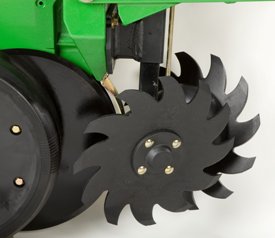 SharkTooth wheel
SharkTooth wheel
The unit-mounted row cleaner features the SharkTooth wheel. The beveled, sharpened edge of the teeth on the SharkTooth aggressively cut tough residue that lies in the path of the row-unit. The curved tooth design sweeps a clear path for the openers and resists residue buildup.
The wheels are arranged in a staggered fashion with one wheel leading the other, ensuring complete clearing of the row-unit path. The wheels can also be run side-by-side if desired, by simply relocating the wheels to existing holes on the row cleaner bracket.
The bearing on the SharkTooth wheel is sealed and requires no regular maintenance. Bearing shields are used between the wheel and the mount bracket to prevent residue wrapping and buildup around the bearing housing.
Adjustability
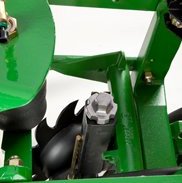 Row cleaner adjustment knob
Row cleaner adjustment knob
The unit-mounted row cleaner offers a convenient screw adjustment feature for changing the depth setting. The acme screw is enclosed within the structure of the mounting bracket, providing protection from the elements.
The adjustment knob for the screw adjustment is accessible from the top of the parallel arms. The knob can be adjusted by hand, or by using a socket.
The adjustment is detented in 1.6-mm (1/16-in.) increments, allowing for quick, easily repeatable adjustments across all rows of the planter.
An indicator rod and scale on the front of the row cleaner bracket indicate the current setting. If a condition is encountered where use of the row cleaner is not desired, it can be set so that the wheels do not engage the soil surface.
Operational notes and compatibility
Use of row cleaners is not recommended when surface application pre-plant herbicide is used prior to planting. When using pre-plant incorporated herbicide, the row cleaner should be adjusted to minimize soil disturbance so as not to reduce the effectiveness of the incorporated herbicide.
Drive chain shields are recommended for use with row cleaner attachments.
Two different models of screw-adjust, unit-mounted row cleaners are available; the standard row cleaner for 762-mm (30-in.) row spacing and the narrow row cleaner for 508-mm (20-in.) or 558.8-mm (22-in.) row spacing.
NOTES:
-
Screw adjust, unit-mounted row cleaners are fully factory installed when ordered with the planter
-
Not compatible with use of frame-mounted coulter
-
Row spacing less than 762 mm (30 in.) requires the narrow row cleaner option.
-
For 1795 12/23, 12/24, 16/31, and 16/32 row machines, unit-mounted row cleaners are provided on the front rank of rows only.
-
For DB60 47R15 machines, unit-mounted row cleaners are provided on the row-units with short parallel arms only. They provide the 24 rows set on 762-mm (30-in.) spacing row cleaners.
-
Not compatible with the use combination of long parallel arms and MaxEmerge 5e row-units.
SharkTooth is a trademark of Yetter Manufacturing, Inc.
Take planter monitoring to the next level with SeedStar™ 3 HP monitoring system
SeedStar 3 HP overview
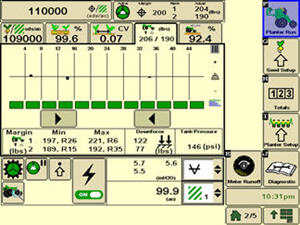 SeedStar 3 HP shown on the GreenStar™ 3 2630 Display
SeedStar 3 HP shown on the GreenStar™ 3 2630 Display
Building upon the foundation of previous SeedStar monitoring, the SeedStar 3 HP monitoring system takes planter monitoring to the next level. When paired with the GreenStar 3 2630 Display, the SeedStar 3 HP monitoring system provides critical information about the planting process to the operator within the tractor cab. SeedStar 3 HP is compatible with the GreenStar 3 2630, the Gen 4 4200 CommandCenter™ Display, the Gen 4 4600 CommandCenter Display, the 4240 Universal Display, and the 4640 Universal Display.
Detailed planter performance information allows the operator to make adjustments needed for planter optimization. After all, with rising costs, it is imperative to make sure that every seed is planted accurately and precisely within the seed furrow for maximum yield potential.
The SeedStar 3 HP planting functions are fully integrated with the full spectrum of Precision Ag Technology applications such as John Deere Section Control for Planters, GreenStar 3 2630 Display, AutoTrac™ assisted steering system, John Deere Operations Center, JDLink™ telematics system, and others. Integrated planting technologies, for better asset utilization and ease of use, is just part of what SeedStar 3 HP provides.
SeedStar 3 HP main run page
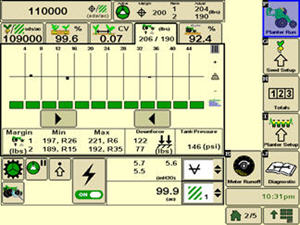 SeedStar 3 HP main run page
SeedStar 3 HP main run page
SeedStar 3 HP has an updated main run page layout. With the use of tabs toward the top of the screen it is much easier to navigate through readings such as population, singulation, spacing, downforce, and ride quality. If for some reason an issue arises with a row-unit, the tab will turn red indicating there is an issue. The tab can be pushed and lead to what is causing the issue. Inside each tab, there will be a bar graph detailing information specific to that tab. The picture shows what a population bar graph looks like. This layout improves functionality and overall ease of use while planting.
SeedStar 3 HP seed singulation monitoring
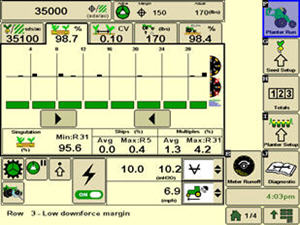 SeedStar 3 HP seed singulation planter run page
SeedStar 3 HP seed singulation planter run page
Understanding meter singulation performance on the planter is critical to minimizing the amount of seed multiples and skips. As a result, the SeedStar 3 HP monitoring system provides real-time information, from the redesigned seed sensors placed in each brush belt cartridge, about the overall seed singulation performance.
As seen in the screen shot image above, overall singulation performance is seen in the tab at the top of the screen. Seed skip and multiple sources of information are displayed below the bar graph of the run page. This provides the operator a better understanding of relative seed multiple and skip data on a row-unit basis within one easy glance at this run page.
Also, within the seed singulation planter run page, information about row-units with the highest percentage of seed multiples and skips is provided in order to make necessary adjustments for better planter optimization.
SeedStar 3 HP row-unit downforce planter run page
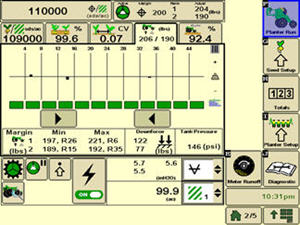 SeedStar 3 HP downforce planter run page
SeedStar 3 HP downforce planter run page
With changing field conditions, it is important to monitor down force to ensure consistent seed placement. Seeds placed too shallow or too deep can impact emergence and affect yield.
With the SeedStar 3 HP monitoring system, row-unit downforce information is measured by the downforce sensor and sensor and transmitted to the GreenStar Display in the tractor cab. The row-unit downforce information is displayed on the top portion of this run page with more row-unit downforce information on the lower portion.
Active downforce takes SeedStar 3 HP even further by removing constant downforce adjustments from the operator and actively controlling the downforce system to maintain a desired target margin. Just set the row-unit target margin value and the active downforce system works automatically to make sure the planter maintains this value-achieving, precise soil penetration and consistent planting depth without sidewall soil compaction. This frees the operator from constantly making manual downforce adjustments as conditions change.
SeedStar 3 HP ride quality and ground contact run page
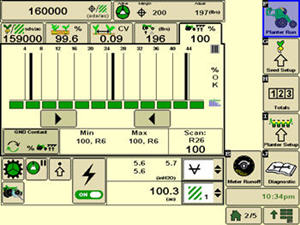 SeedStar 3 HP ride quality and ground contact run page
SeedStar 3 HP ride quality and ground contact run page
The fifth tab from the left in SeedStar 3 HP is a shared tab between ground contact and ride quality. Operators may change between the two criteria based on their planter setups or personal preferences. Ground contact displays the percentage of time the row-units are engaging the ground, the load is measured via a sensor through the gauge wheels. Ground contact is recommended to ensure the row-unit is maintaining proper depth at higher planting speeds.
SeedStar 3 HP seed spacing monitoring
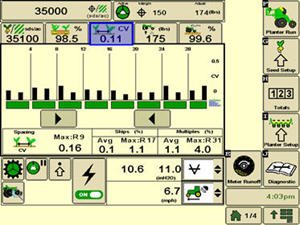 SeedStar 3 HP seed spacing planter run page
SeedStar 3 HP seed spacing planter run page
Throughout the planting process, obtaining good seed spacing is critical towards achieving plant growing conditions for maximum yield potential.
Today, many items are adjusted on the planter prior to planting to optimize overall seed spacing performance. But after such adjustments are made, information about the actual seed spacing performance during planting was missing within the planter monitoring system. With SeedStar 3 HP, seed spacing information is transmitted live via the GreenStar Display to show the operator exactly what is happening with the planter behind them.
The SeedStar 3 HP transmits seed spacing information onto the bar graph (shown above) for easy understanding of planter seed spacing performance. Also, information about seed skips and multiples are provided to help understand actual planter meter performance and other related system functions in order to make necessary adjustments if needed.
SeedStar 3 HP meter runoff page
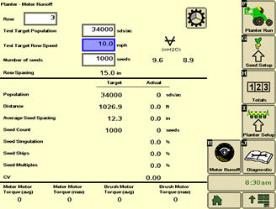 SeedStar 3 HP runoff page
SeedStar 3 HP runoff page
On SeedStar 3 HP, the meter runoff page allows growers to test meters before going to the field. Growers can now test the meters without removing them and have confidence in their planter’s performance before going to the field. Many parameters can be viewed during this test such as: singulation, seed count, skips, multiples, coefficient of variation (cv), etc. This test assures that the meter is in healthy condition and ready to plant when conditions are appropriate.
Other SeedStar 3 HP monitoring features include:
- Capable of monitoring individual row-unit and overall planter performance in terms of seed spacing, singulation, and row-unit downforce
- On-screen indication of down force sensor assemblies once configured within the monitor settings application
- Full-color display icons for easy recognition and overall aesthetics
- Downforce system controls with the GreenStar display application
- A run page that allows operator to view relative population levels of all rows on one screen
- Mapping of actual and target seed rates can be mapped in Operations Centers.
- Reprogrammable utilizing controller area network (CAN) via Service ADVISOR™ diagnostics system or Service ADVISOR Remote with JDLink™ connectivity
- User-configurable high fertilizer pressure alarm that allows the operator to be warned when fertilizer pressure reaches a specific level
- Automatic Fast Start for SeedStar 3 HP ensures that seeds will be place accurately when starting from a stop.
- Automatic tractor speed source selection. When equipped with an 8000/9000 Series Tractor, the system selects the radar speed or allows for manual speed input selection.
Components and operation
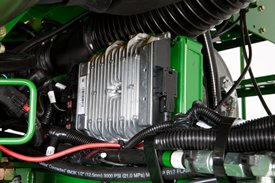 Planter main controller
Planter main controller
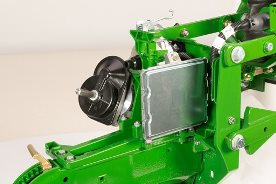 Row-unit controller (RUC) with two electric motors
Row-unit controller (RUC) with two electric motors
The SeedStar 3 HP monitoring system contains the following components in order to support the planting data transfer to the GS Displays:
- Planter main controller
- Downforce sensor assembly
- Electric power gen (EPG)
- Row-unit controller (RUC)
The row-unit controller processes the row-unit data from the sensor node assemblies located on the row-unit head casting. The processed information is then sent to the planter main controller to be integrated into the displayed information being sent to the GreenStar Display.
Downforce sensor assemblies are found on row-units with sensor installed. The downforce sensor assembly is put together with the gauge wheel depth-adjustment handle and provides gauge wheel pressure information to the respective sensor node for data processing.
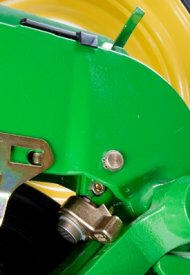 Downforce sensor installed
Downforce sensor installed
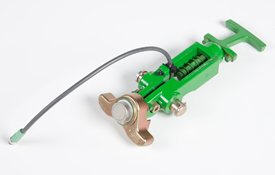 Downforce sensor
Downforce sensor
Depending on the planter size, different configurations of sensor and downforce sensors are installed in support of the SeedStar 3 HP monitoring system.
Increase productivity with ExactEmerge™ trench delivery system and BrushBelt™ delivery system
It is very challenging to get the crop planted during the optimum planting window or as close to the optimum planting day as possible. Rate-of-yield loss accelerates greatly after the optimum window has passed. This is especially true in the northern U.S. and Canada. ExactEmerge maintains accurate speed placement at higher speeds; growers can avoid missing that peak planting time, thereby helping to get the highest crop yields.
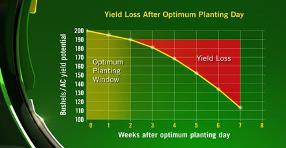 Yield loss after optimum planting day
Yield loss after optimum planting day
With the BrushBelt trench delivery system, the spacing in the trench does not change from even to uneven terrain. This can be a problem with a traditional seed tube. Seed bounce and ricochet may occur as slopes increases, ultimately decreasing seed spacing performance.
The design of the BrushBelt system provides the best solution for the lowest release of seed to the bottom of the trench. The use of a brush provides the meter with an infinite amount of placement opportunities for each seed. This is what gives producers the confidence that every seed will have the desired spacing that a seed tube cannot provide.
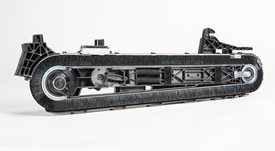 Maintenance-free BrushBelt system
Maintenance-free BrushBelt system
When the brush comes around the pulley, it expands and allows the seed to be transferred from the bowl to the brush very easily. The brush then carries the seed down toward the trench, ensuring that there is no movement as it moves down the length of the cartridge.
Once the brush reaches the lower pulley, the BrushBelt system expands again to loosen the grip on the seed, and the centrifugal force releases the seed. Another advantage with the BrushBelt system and cartridge at all speeds up to 16.1 km/p (10 mph) is the ability to match the seed rearward trajectory to the forward ground speed of the planter. This provides a dead drop of the seed with no bounce and no roll at the bottom of the trench.
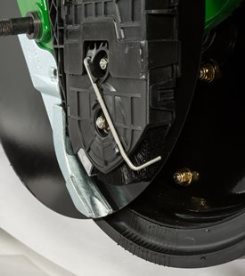 BrushBelt conditioner engages brush bristles
BrushBelt conditioner engages brush bristles
John Deere’s ExactEmerge cartridge is self-cleaning. When an operator uses seed treatments or is forced to plant in less than ideal soil conditions, the design of the trench delivery system sheds buildup from the BrushBelt. A brush conditioner is located at the bottom of the cartridge to remove remaining residue and prevent the bristles from sticking together.
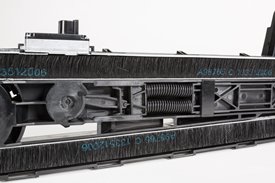 Brush proximity helps clean sensor
Brush proximity helps clean sensor
Another advantage over a seed tube is that the BrushBelt system also acts as a cleaner to the seed sensor compared to a seed tube.
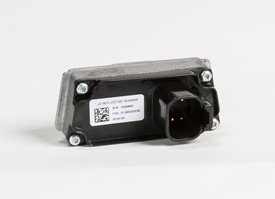 Sensors for trench delivery system
Sensors for trench delivery system
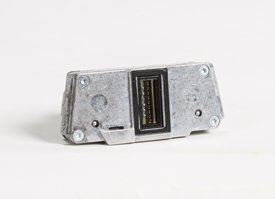 Reflective seed sensor
Reflective seed sensor
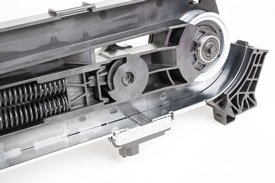 Sensor on trench delivery system
Sensor on trench delivery system
On all ExactEmerge row-units, each cartridge is equipped with sensors. As the seeds are being delivered through the BrushBelt delivery system controls, they pass the reflective seed sensor. The delivery system slides every seed past the seed sensor to read and send the signal to the controller. The seed sensor and design can provide sensor performance at higher seeds per second with no population adjustment as needed with seed tube sensors. This seed sensor data is actual row-unit performance data. In comparison, seed tube sensors add 10 percent population in soybean planting to adjust for the seeds missed due to placement within the seed tube. The BrushBelt system holds each seed in place until released in the trench, allowing the seed sensor a more accurate read.
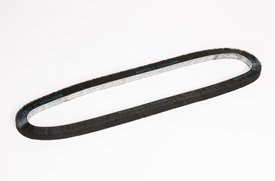 BrushBelt removed from trench delivery system
BrushBelt removed from trench delivery system
The BrushBelt system requires no maintenance and has a wear life designed to match the wear life of the other wear components. Since operations vary, as do soils and field content, it is recommended to replace the BrushBelt after noticeable wear or decreased performance.
Changing the belt is easy. One latch removes the meter over the trench delivery system. Grab the cartridge by the grip and pull toward the body, releasing it from the electric motor fitting. Lift the trench delivery system up and remove the sensor wiring harness to completely pull the cartridge out of the row-unit.
There are two plastic covers that snap off to uncover the belt; remove the covers and then twist the circular spring tensioner dial with the yellow arrow on it to release the tension on the springs. Once tension has been removed, pull the belt out. It is also recommended to change the stainless-steel wear strip at this time as well, which also slides right out of place without the use of tools.
NOTE: It is recommended to use a talc/graphite mixture with ExactEmerge. Best results have been 80 percent talc and 20 percent graphite. For certain regions and territories, talc and talc/graphite mixes are restricted from use; in this case, use a wax-based fluency agent.
Achieve accuracy with curve compensation
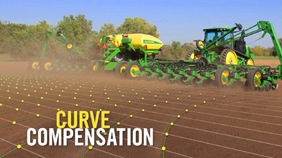 Curve compensation with planters
Curve compensation with planters
Terraces or waterways are two of many field obstacles that make planting on a curve challenging. When planters utilize drive shafts, they are not able to control each individual row-unit; as a result, planting on a curve presents an issue of maintaining 100 percent population. Since the inside rows are moving slower than the outside rows, the inside rows will be overpopulated while the outside rows are underpopulated.
With ExactEmerge™ planters and equipped MaxEmerge™ 5e planters, the curve compensation feature allows each row to receive an individual signal based on the speed at which the row-unit is moving, maintaining the correct population across the width of the planter. Without curve compensation, there could be as much as a 24 percent drop in population accuracy, which is equivalent to 8,600 seeds per acre when planting at 36,000 seeds per acre. Curve compensation measures acceleration within the main planter controller and utilizes speed inputs to ensure each row has the desired population accuracy.
Mobile row-unit runoff
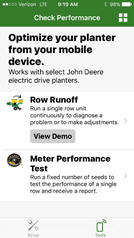 Row Runoff diagnostic test
Row Runoff diagnostic test
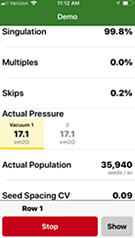 The test functions from a mobile device
The test functions from a mobile device
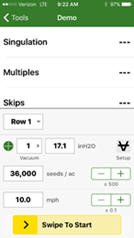 Determine optimum settings without being in the cab
Determine optimum settings without being in the cab
The first day of planting season can be as productive as the last with mobile row-unit runoff. The mobile row-unit runoff activation on the planter main controller (PMC) allows operators to make adjustments to maximize row-unit performance from a mobile device at the rear of the planter for both preseason and in-season use - all enabled through the EquipmentPlus app.
Mobile row-unit runoff allows growers to perform test-stand functions from a mobile device connected to the planter.
The row runoff test provides complete diagnostic checks both preseason and in season. With the row-unit runoff test, the operator can make adjustments from the mobile device, including vacuum pressure, to determine the optimum meter and vacuum settings. This app functionality will help avoid making trips to the cab while validating meter performance.
During preseason planter inspections and set up, utilize the meter performance test to validate meter accuracy, similar to a test stand without leaving the farm. Test all systems on the planter, not just the meter, providing confidence that all planter systems are ready to plant. Reports are generated from the test providing information the operator can save and send for future reference.
Before heading to the field, the operator will benefit from knowing the best row-unit and vacuum settings for each variety selected to plant that spring.
Watch this video to see mobile row-unit runoff in action.
Mobile row-unit runoff will work with any model year 2015 or newer ExactEmerge™ or MaxEmerge™ 5e equipped planter. Mobile row-unit runoff can be added with attachment AA93169.
For model year 2018 and newer ExactEmerge planters, mobile row-unit runoff is included in base equipment. For model year 2020 and newer MaxEmerge 5e planters, mobile row-unit runoff is included in base equipment. For planters not equipped from the factory, mobile row-unit runoff can be added with attachment AA93169. A mobile row-unit runoff and Easy Fold package can be added with attachment AA97849 (only available with 1775NT and 1795 Planters with a 2-point hitch and model year 2019 and newer DB Planters with Gen 4 based frame folding).
NOTE: Mobile runoff utilizes the EquipmentPlus app available on select iPad® tablets, iPhone® smartphones, and Android™ devices.
Mobile row-unit runoff and Easy Fold aftermarket for field conversion kits
The below software bundles include the functionality explained above for machines not ordered with the feature from the factory. Compatible machines include all the necessary sensors and harnesses needed to make the feature function. The attachment part is software only. Follow the mobile runoff ordering and software push guide below for ordering and installation.
SeedStar™ 3 HP conversion to SeedStar 4HP
Mobile runoff ordering and software push guide
iPad and iPhone are trademarks of Apple Inc. Android is a trademark of Google LLC.
SeedStar™ 4HP monitoring system – see speed meet accuracy in real time
Have you wanted to view more than one planter chart at once? SeedStar 4HP gives you multiple views and configurations in one simple overview page to fit your preferences. You can complete the simplified setup from the Work Setup page instead of having multiple applications to open.
SeedStar 4HP is designed to optimize the in-cab monitoring experience exclusively on the Gen 4 4600 CommandCenter™ display or 4640 Universal Display for growers with ExactEmerge™ planters and MaxEmerge™ 5e planters. With SeedStar 4HP, operators will easily see key planter information with customizable run pages, zoom functionality, and simultaneous graph and performance measurements. SeedStar 4HP is included in base on all model year 2018 ExactEmerge and MaxEmerge 5e planters.
Features overview:
- View multiple planters' at-a-glance bar charts simultaneously
- Three default planter run pages show key planter functions in easy-to-view layouts
- Highly configurable run pages allow SeedStar modules to be customizable
- Zoom feature allows quick row-by-row detailed information
- View dual bar graphs to see multiple planter details at one time
- SeedStar application to make adjustments to planter functions
- Simplified setup through the work set-up page
- Advanced rates allow up to six different rates across 48 rows
- The SeedStar 4HP monitoring system requires the Gen 4 4600 CommandCenter or 4640 Universal Display. These displays allow the operator to benefit from the updated interface, enhanced processing speeds, and easy setup (learn more here).
SeedStar 3 HP conversion to SeedStar 4HP with mobile row-unit runoff aftermarket for field conversion kits
Growers who are currently running model year 2017 planters, model year 2017 and newer performance upgrade kits, or model year 2017 and newer custom-built planters with the SeedStar 3 HP monitoring system can upgrade to the SeedStar 4HP monitoring system with mobile row-unit runoff. The attachment part, AA100382, is software only. The Gen 4 display software version will need to be 19-1 or newer and will require planter apps. Follow the mobile runoff ordering and software push guide below for ordering and installation. Retrofitted planters and custom-built planters will also require the John Deere Connect Mobile kit, 0048PC, from the Precision Ag Technology Price Pages and wiring harness AA83662 to enable the mobile row-unit runoff feature. Please reference Parts Advisor and DTAC Solution 105181 for model-specific mounting brackets. SeedStar 4HP requires the Gen 4 4600 CommandCenter v2 display or 4640 Universal Display.
Default planter run pages
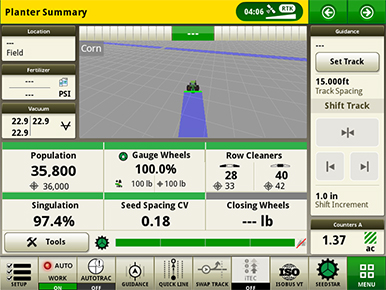 Planter summary default run page
Planter summary default run page
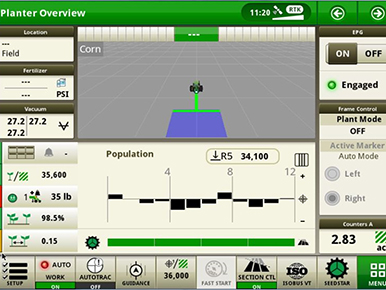 Planter overview default run page
Planter overview default run page
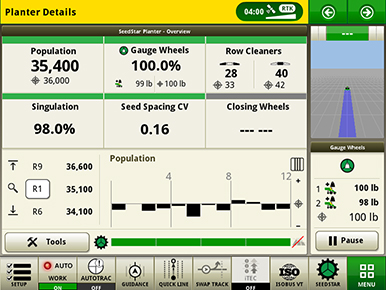 Planter details default run page
Planter details default run page
Three default run pages show key planter functions in different views to give fast and easy access to important planter information.
Custom run pages
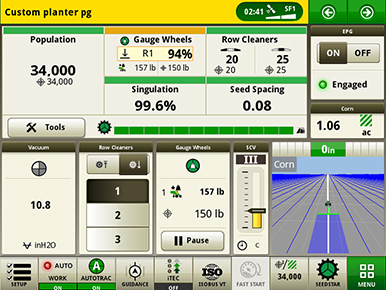 Customizable run pages
Customizable run pages
There are customizable run pages that allow the operator to build pages that fit their operation with different modules, like the example shown above.
Zoom functionality
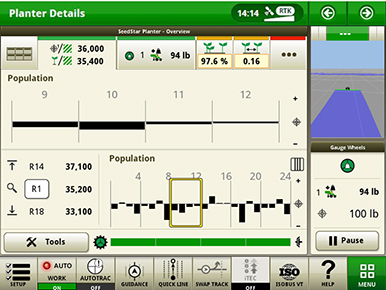 Zoom feature showing a group of rows
Zoom feature showing a group of rows
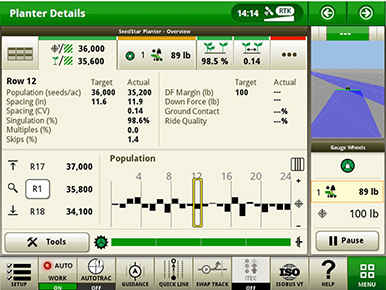 Zoom feature showing a single row
Zoom feature showing a single row
The zoom feature allows the operator to touch a section or row of the planter and get detailed information quickly.
Dual bar graphs
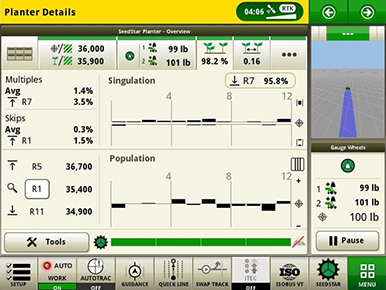 Dual bar graph showing singulation and population simultaneously
Dual bar graph showing singulation and population simultaneously
Dual bar graphs allow operators to view multiple planter details at one time.
SeedStar application page
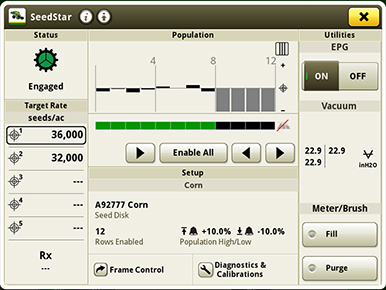 SeedStar application run page
SeedStar application run page
In the SeedStar application, many adjustments can be made, including manually activating section control. SeedStar 4HP allows up to 48 individual row sections. There are several setup features such as crop, seed disk, number of rows being planted, population alarms, and limits. Seed rates can be modified, electric power generation (EPG) can be turned on or off, vacuum can be adjusted, and the fill and purge functions can be used from the SeedStar application. Frame control, as well as diagnostics and calibrations, can be accessed at the bottom of the screen.
Settings Manager in SeedStar 4HP
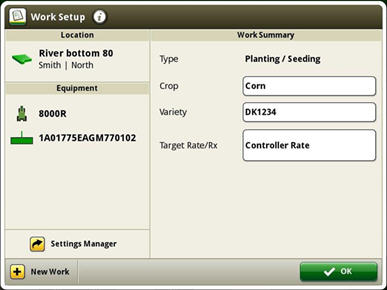 Access Settings Manager on the Work Setup screen
Access Settings Manager on the Work Setup screen
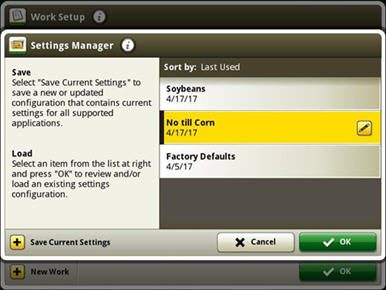 Settings Manager screen
Settings Manager screen
Reduce set-up time between changing crops or field conditions by recalling saved settings used previously with Settings Manager, included with every SeedStar 4HP system. This feature allows saving and recalling planter and tractor settings for optimum performance in different conditions.
Settings Manager can be used to save all the adjustment and inputs associated to a particular crop or condition. An example would be to store all population rates, downforce pressure, row cleaner adjustments, and closing wheel settings for planting corn and storing a separate, unique set of adjustments for soybeans. In addition, Settings Manager stores tractor settings such as selective control valve (SCV) flow and detents, infinitely variable transmission (IVT™) settings, eco modes, and more.
Custom rates in SeedStar 4HP
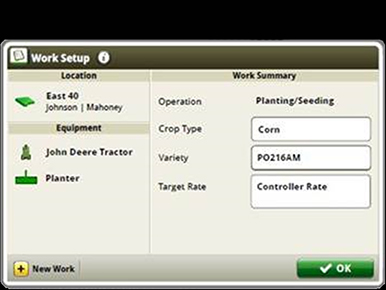 Variety set-up page
Variety set-up page
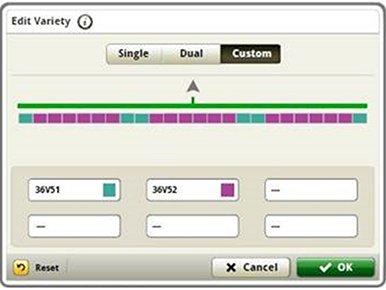 Rate set-up page
Rate set-up page
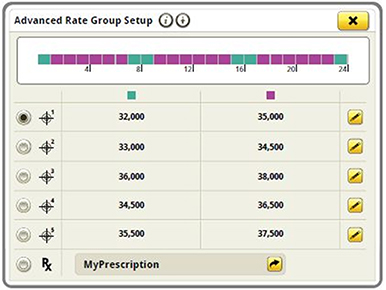 Group rate set-up page
Group rate set-up page
Custom rates allow for individual row population control and row-by-row documentation where up to six different rates can be assigned across an up to 48-row planter. This allows growers interested in planting seed corn with ExactEmerge or MaxEmerge 5e the capability to assign specific populations to male and female rows for planting. This feature can also be used to create tram lines or other applications where custom rates by row are needed.
NOTE: Individual rates are tied to varieties, so each individual rate needs a unique variety name.
NOTE: Advanced rates are not compatible with prescriptions or they cannot be run at the same time.
Additional information
For additional information on feature functionality on the Gen 4 Display, visit the links below:
YouTube is a trademark of Google LLC.
Compatibility
| SeedStar 4HP compatibility | |
| Planters | All models ordered with ExactEmerge or MaxEmerge 5e row-units NOTE: Performance upgrade kits are equipped with SeedStar 3HP only but can be upgraded by purchasing part number AA100382. |
| Displays | Gen 4 4600 CommandCenter equipped with Version 2 Processor or 4640 Universal Display Dual-display mode is compatible with mid model year 2019 planter software. |
| John Deere Active Implement Guidance™ | Compatible with SeedStar 4HP on Gen 4 displays with VT mode and required activations and subscriptions |
| AutoTrac™ Implement Guidance | SeedStar 4HP is compatible with ATTA and ATIG; not compatible with >48 row electric drive planters. |
| AutoTrac Turn Automation | SeedStar 4HP is compatible with ATTA and ATIG; not compatible with >48 row electric drive planters. |
John Deere Connected Support™ prevents downtime and efficiently resolves issues with revolutionary technology-based solutions
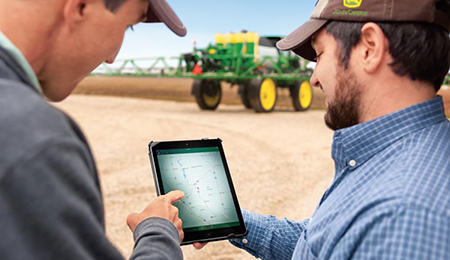 Connected Support technology
Connected Support technology
When you buy John Deere equipment, you expect reliability. You also know that problems can happen, and a product is only as good as the support behind it. That’s why John Deere equipment is prepared with technology that senses potential issues and can alert you and your dealer promptly—in the cab or anywhere you are.
John Deere Connected Support is a revolutionary change to support that leverages technology and the connectivity of JDLink™ telematics to prevent downtime and resolve problems faster. These tools decrease downtime by an average of 20 percent, enabling faster responses to unexpected problems and reducing technician trips to your machine. For some issues, unplanned downtime can even be prevented altogether through prediction of the issue.
With your permission, John Deere Connected Support:
- Keeps you running by monitoring machine health and promptly alerting you and your dealer of issues
- Saves time by remotely viewing in-cab displays, reducing trips to the machine
- Reduces or even eliminates technician trips to a machine through remote diagnostic and remote software reprogramming capabilities
- Connects experts with the information needed to respond to downtime faster and prevent it altogether
With more than a decade of experience leveraging connectivity to solve problems, no one else has the experience, tools, and knowledge to keep you running as John Deere and your John Deere dealer can. Connected Support is an in-base feature on all John Deere products with factory- or field-installed JDLink.
Specifications
| Key Specs | 1725nt-planter Current Model |
|---|---|
| Number of rows | 8 |
| Row spacing | 8 Row: 76 cm 30 in. |
| Frame - Fold configuration | Stack-folding |
| Frame - Flexibility | Up: 10 degree (angle) Down: 7 degree (angle) |
| Row unit seed hoppers | Mini-Hoppers |
| Seed Meters | Base Vacuum |
| Rows and Row Spacing | |
| Number of rows | 8 |
| Row spacing | 8 Row: 76 cm 30 in. |
| Frame | |
| Fold configuration | Stack-folding |
| Flexibility | Up: 10 degree (angle) Down: 7 degree (angle) |
| Hitch | |
| Lift System | |
| Type | Semi-integral only |
| Tires | |
| Base | 12.5L-15SL 20 ply implement: 303 kPa 3.0 bar (44 psi) 7.60-15 8 ply implement: 359 kPa 3.6 bar (52 psi) 7.6-15 6 ply - traction: 276 kPa 2.8 bar (40 psi) |
| Row Units | |
| Type | ExactEmerge™ row units or MaxEmerge™ 5e row units |
| Opener | Tru-Vee Double Disk |
| Row unit seed hoppers | Mini-Hoppers |
| Row unit down force | Adjustable heavy-duty ---- |
| Scrapers, opener blades | |
| Seed tube sensors | |
| Seed Meters | |
| Base | Vaccum |
| Central Commodity System | |
| Drive System | |
| Base | 56 V electric drive |
| Markers | |
| Control | |
| Marker disk | |
| Closing System | |
| Rubber tire closing system | |
| Cast iron closing system | |
| Herbicide and Insecticide | |
| Liquid Insecticide System | |
| Seed Monitor System | |
| Base | SeedStar™ electronic system |
| Tillage Attachments | |
| Fertilizer | |
| Fertilizer opener type | |
| Dry fertilizer | |
| Dimensions | |
| Transport width (without markers) | 8 Row: 3 m 9.83 ft |
| Transport height | 8 Row: 4 m 13.08 ft |
| Ag Management Solutions | |
| Additional Information | |
| Recommended tractor horsepower | Vaccum system hydraulic drive: horsepower required: 4.5-10.4 kW 6-14 hp Minimum tractor size: 201 kW 270 hp Tractor recommendation: Currrent model (minimum) 8430 MFWD with dual rear tires and 20 front weights. |
| Recommended tractor hydraulics | Hydraulic oil required to operate the planter: 227 L/min 60 gpm Hydraulic system standby pressure: 15,513 kPa 155 bar (2250 psi) Hydraulic system working pressure: 20,684 kPa 207 bar (3000 psi) Hydraulic system burst pressure: 82,737 kPa 827 bar (12,000 psi) |



